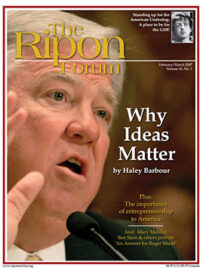Plenty of explanations have been offered as to why the 2006 elections went the way they did for Republicans, but most seem to confuse the voters’ overall frustration with a call for a radical policy shift.
After all, evidence of the Republican Congress’s numerous successes is as plain as day. Pro-growth policies have helped create over 7.2 million new jobs in the last three-and-a-half years, over thirty eight million seniors now have prescription drug coverage through Medicare, and our ongoing offensive against terror has translated into no attacks on American soil since September 11, 2001.
For the voters, however, a loss of confidence in the integrity of the Congress and its leaders was enough to encourage them to seek an alternative. House Republicans will work to earn back the trust of the electorate by breathing new life into conservative principles, so that we may continue to offer the American people a positive, innovative agenda that builds on the progress we have made.
∗∗∗∗∗∗∗∗∗∗
Jobs and the economy. As a matter of first principles, Republicans believe hard-working Americans should be able to keep more of what they earn to save and invest for the future.
That is why the Republican Congress delivered historic tax relief in 2001 and 2003, the success of which could not be clearer. The U.S. economy has grown for 21 straight quarters, and has created over 7.2 million new jobs since August 2003.
Homeownership has hit record levels, and so has the Dow. In addition, we have been able to cut the deficit in half two years early. Tax cuts are working, raising more revenue than expected while keeping rates low for Americans. They should be made permanent.
House Republicans will work to earn back the trust of the electorate by breathing new life into conservative principles.
We will also work to implement tough spending reform, which is an integral part of building a smaller, smarter, and more efficient federal government. If we can address the pitfalls of earmarks in a responsible manner, continue to rein in the growth of the rate of federal spending and pass the line-item veto, we will go a long way toward getting the budget in balance sooner rather than later.

The responsibility for fiscal accountability ultimately lies with the government. And government must make the same tough choices any working family would make when faced with a budgetary crisis – reduce wasteful, unnecessary, and superfluous spending. Unfortunately, Democrats believe they can go on a federal spending spree and then raise taxes to pay for it. House Republicans will protect taxpayers from Democrat tax hikes.
∗∗∗∗∗∗∗∗∗∗
Protecting our national security. Since the attacks of September 11, 2001, the first priority of the federal government has been to protect our homeland and vanquish terror.
In some cases, that has meant sending the brave men and women of our Armed Forces into harm’s way. As their elected representatives, we have an obligation to do everything in our power to see to their safety and support their success.
Today, that obligation compels us to focus on events in Iraq. There are certainly differences of opinion about how best to succeed there, but our troops should never become a political tool.
With that in mind, House Republicans have come together to craft four core principles that guide our commitment to victory in Iraq:
- There is only one Commander-in-Chief.
- Failure in Iraq is not an option.
- We are opposed to cutting off funding for our troops.
- Congress has a constitutional right and obligation to exercise oversight.
In accordance with the fourth principle, we have identified a set of strategic benchmarks designed to measure the effectiveness of President Bush’s new strategy in Iraq, and to hold the Bush Administration and the Iraqi government accountable for their roles in achieving success.
We will also work to implement tough spending reform, which is an integral part of building a smaller, smarter, and more efficient federal government.
Finally, we have proposed the creation of a bipartisan panel to monitor these developments, so we can work together across party lines to track these benchmarks and help ensure the success of this critical mission.
This Congress will not lack for its share of conflict on the battlefield of ideas. That is a good thing for the American people as it will allow them to see clearly where the two parties’ priorities differ.
The principles of fiscal conservatism, limited government, and personal responsibility remain the beacons by which we communicate our ideas to the American people. If we can breathe new life into these values and provide an effective counterpoint for the Democrat agenda, we will have gone a long way towards restoring our trust with the American people.
Adam Putnam represents the 12th District of Florida in the U.S. House of Representatives. He serves as Chairman of the House Republican Conference.




